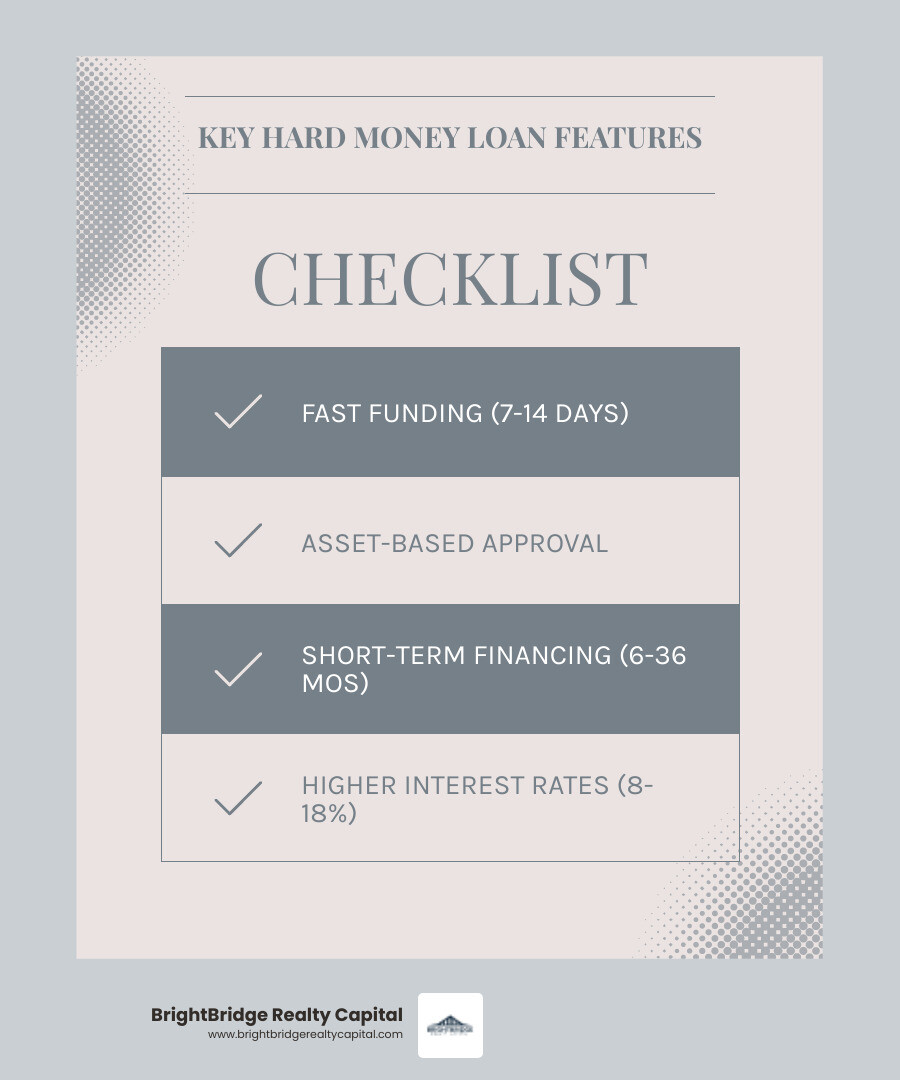What is a Hard Money Loan and When Should You Use One?

Understanding Hard Money Loans: A Real Estate Investor's Guide
A hard money loan is a short-term, asset-based financing tool for real estate investors, funded by private lenders instead of banks. Approval hinges on the property's value as collateral, not the borrower's creditworthiness, allowing for much faster funding than traditional mortgages.
Key Features of Hard Money Loans:
- Fast funding: Close in 7-14 days, versus 30-60 days for traditional loans.
- Asset-based approval: Based on property value (LTV/ARV), not credit scores.
- Short-term financing: Terms typically range from 6 months to 3 years.
- Higher interest rates: Usually 8-18%.
- Private lenders: Funded by individuals or private companies, not banks.
Real estate investors use hard money loans to quickly secure properties in competitive markets, fund fix-and-flip projects, or bridge financing gaps. The term "hard money" refers to the tangible asset (the property) backing the loan. While these loans come with higher costs, they offer flexibility and speed that traditional financing cannot match.
As Daniel Lopez at BrightBridge Realty Capital, I've seen how these loans can be the difference between a successful investment and a missed opportunity. Understanding when and how to use them is critical for any serious investor.

Handy hard money loan terms:
What is a Hard Money Loan and How Does It Work?
A hard money loan operates very differently from a traditional mortgage. While banks scrutinize your credit score and financial history, hard money lenders focus almost exclusively on the property itself. These loans are collateral-focused, making the property's equity the most important factor.
When you apply, the lender assesses the Loan-to-Value (LTV) ratio—the loan amount divided by the property's current value. Most lenders work with LTVs between 50% and 80%. For fix-and-flip projects, they also consider the After Repair Value (ARV), a forward-looking valuation that traditional banks rarely use.
Hard money loans come from private lenders, such as individuals or companies like BrightBridge Realty Capital, not banks. Unbound by the same strict regulations, they can move faster and be more creative. The underwriting process is streamlined; a credit check is common but less critical than the property's value and your exit strategy—how you plan to repay the loan.

| Feature | Hard Money Loans | Traditional Mortgages |
|---|---|---|
| Speed | Fast (7-14 days) | Slow (30-60+ days) |
| Approval Basis | Property value (collateral, ARV, LTV) | Borrower creditworthiness, income, DTI |
| Term Length | Short (6 months to 3 years) | Long (15-30 years) |
| Interest Rates | Higher (typically 8%-18% or more) | Lower (typically 4%-7% for conventional loans) |
| Lender Type | Private investors, companies | Banks, credit unions, government-backed institutions |
How a hard money loan differs from a traditional mortgage
The primary difference is speed. A hard money loan can close in 7-14 days, while a traditional mortgage takes 30-60 days. This speed is possible because approval is based on the property's value, not the borrower's financial history. This means documentation requirements are significantly lighter; you'll need basic identification and project details, not years of tax returns and bank statements.
Consequently, borrower qualifications are more flexible. Poor credit won't automatically disqualify you if the property's fundamentals and your exit strategy are solid. Because private lenders operate outside the heavy regulatory environment of banks, they can set their own standards and move quickly. In the hard money world, property equity drives everything, making it an ideal tool for financing distressed properties that banks would reject.
Typical terms, rates, and fees
Understanding the costs of a hard money loan is crucial. You trade lower costs for speed and flexibility.
- Interest rates: Expect higher rates, typically 8% to 18%, reflecting the lender's increased risk and the loan's convenience.
- Loan terms: These are short-term loans, usually lasting 6 to 36 months. They are not a permanent financing solution.
- Origination points: Lenders charge upfront fees of 1% to 5% of the loan amount. A $400,000 loan with 3 points would cost $12,000 at closing.
- Down payment requirements: You'll need more cash upfront, typically 20% to 40% down, to ensure you have significant skin in the game.
- Balloon payments: Most loans are structured with interest-only payments during the term, followed by a single large payment of the entire principal at the end. This requires a solid exit strategy, like selling or refinancing the property.
Who Uses Hard Money Loans and Why?

Hard money loans are a go-to tool for real estate investors who need to act fast and can't wait for traditional bank approval. They are not intended for typical homebuyers seeking a 30-year mortgage.
Primary users include property flippers and real estate developers who need to secure a property or land quickly to capitalize on an opportunity. These loans are also accessible to borrowers who don't fit the traditional lending box, such as self-employed individuals or those with recent credit issues. Hard money lenders focus on the asset's value and your plan, not just your W-2s.
Common use cases for hard money loans
- Fix-and-flip projects: Quickly secure a property and fund renovations to maximize profit in a short timeframe.
- Bridge financing: Cover a short-term funding gap, such as when buying a new property before an old one has sold.
- New construction projects: Get a project off the ground quickly while arranging for long-term conventional financing.
- Land acquisition: Secure a parcel of land that traditional banks won't finance, often because it doesn't generate income.
- Commercial property purchases: Finance unique commercial properties or those needing repairs that don't meet standard lending criteria.
Scenarios where hard money is the best option
A hard money loan is often the most strategic choice in specific situations:
- Beating competing offers: A fast, all-cash-equivalent offer can win a bidding war. Sellers prefer the certainty of a 7-day close over a 45-day financing contingency.
- Financing a distressed property: Banks often refuse to lend on properties needing significant repairs. Hard money lenders see the after-repair value and will fund the project.
- Bridging a funding gap: Use a hard money loan to acquire and stabilize a property, then refinance into a long-term conventional loan once it's rent-ready.
- Overcoming credit or income issues: If you have solid real estate experience but don't meet strict bank standards, hard money provides an alternative path to funding.
At BrightBridge Realty Capital, we specialize in providing the right money at the right time to help investors capitalize on opportunities that won't wait for traditional financing.
The Pros and Cons of a Hard Money Loan

Deciding on a hard money loan involves weighing its advantages against its costs. These loans offer incredible speed that can make or break a deal, but they also come with risks that can erode profits if not managed carefully.
At BrightBridge Realty Capital, we've seen investors use hard money loans to build wealth quickly, but success requires a clear understanding of the trade-offs. The key is knowing when the benefit of speed outweighs the higher cost. Let's break down both sides.
Key advantages
Investors turn to hard money loans for several compelling reasons, especially in a fast-moving market.
- Fast funding: Close in 7 to 14 days, a crucial advantage over the 30-60 days required for traditional loans, helping you win competitive bids.
- Flexible underwriting: Lenders evaluate deals individually, approving unique properties or borrowers that banks would automatically reject.
- Reduced focus on credit history: The property's value and your investment plan are more important than a perfect credit score.
- Approval based on property value: Lenders focus on the investment's potential (including after-repair value), not just your personal financial standing.
- Less paperwork: The streamlined process saves time and avoids the administrative headaches of traditional mortgage applications.
What are the significant risks of a hard money loan?
It's crucial to be aware of the downsides. Hard money loans are expensive and less forgiving if your project encounters delays.
- Higher interest rates: Expect rates between 8% and 18%, which can significantly impact profitability if not factored into your budget.
- High origination fees: Lenders charge 1% to 5% of the loan amount upfront at closing, reducing your initial capital.
- Short repayment terms: With loans due in 6 to 36 months, there is constant pressure to execute your exit strategy on time.
- Risk of foreclosure: If you fail to repay the loan on time, lenders can foreclose on the property, often with less flexibility than traditional banks.
- Lower loan-to-value (LTV) ratios: Lenders typically cap loans at 50% to 80% of the property's value, requiring a larger down payment and more of your own cash at risk.
Hard money loans are powerful tools for experienced investors with a clear plan and sufficient capital. When used correctly, they can significantly accelerate your real estate investment journey.
Finding a Lender and Exploring Alternatives
Choosing the right hard money loan lender is a critical business decision that can determine the success of your project. You need a reliable partner who understands your vision and can deliver funding on a tight schedule. A lender's reputation for transparency and clear communication is paramount; if they are vague about fees or timelines, consider it a red flag.
What to look for in a hard money lender
When vetting a hard money loan partner, prioritize these qualities:
- Experience in your project type: A lender specializing in fix-and-flips will understand your needs better than one focused on commercial properties.
- Clear communication and transparency: A good lender explains all terms and fees upfront and is responsive. Avoid lenders who are vague or hard to reach.
- Positive reviews and testimonials: See what other investors say about their experience. Did the lender handle challenges well and close on time?
- A quick and reliable closing process: Speed is the main benefit of a hard money loan. At BrightBridge Realty Capital, we pride ourselves on fast closings, often within a week, thanks to our direct lending model that eliminates intermediaries.
Alternatives to hard money loans
While hard money loans are powerful, they aren't the only option. Understanding the alternatives helps you make the best financing decision for your situation.
- Private money loans: These are similar to hard money but often come from individuals (friends, family, or other investors) rather than a company. Terms can be more flexible, but finding these lenders requires networking.
- Seller financing: In this arrangement, the property owner acts as the bank, carrying a note for some or all of the purchase price. This can reduce closing costs and offer flexible terms, but not all sellers are willing or able to offer it.
At BrightBridge Realty Capital, we know every deal is unique. We offer other short-term real estate financing options, including bridge loans and specialized funding structures. We work with you to find a customized solution that aligns with your investment strategy and timeline.
The Hard Money Loan Market in Canada
For investors in Canada, the hard money loan landscape has its own distinct characteristics. While the core principle of fast, asset-based lending is the same, the market operates under a different regulatory structure than in the United States.
Provincial regulations are the primary force shaping private lending. Unlike the U.S., Canada's mortgage industry is governed at the provincial level, so rules on interest rates, licensing, and consumer protection vary significantly between provinces like Ontario, British Columbia, and Alberta. For this reason, it is essential to work with licensed mortgage professionals who understand your province's specific laws.
These professionals often facilitate private lending deals, acting as intermediaries to ensure transactions are compliant. This system provides a layer of oversight while still offering flexibility. The good news is that asset-based lending principles remain the same; lenders focus on property equity and after-repair value (ARV) over credit scores.
Key differences in the Canadian market include:
- Interest rates: Typically range from 9% to 18%.
- Loan terms: Usually span 6 to 24 months.
- Fees: Brokerage and lending fees generally fall between 1% to 5%.
- Legal representation: A lawyer is required for all mortgage transactions in Canada, adding a step that also provides extra protection.
The term hard money loan is used, but you'll also hear phrases like "private lending" or "bridge financing" more frequently in Canadian markets.
Frequently Asked Questions about Hard Money Loans
At BrightBridge Realty Capital, we field many questions from investors exploring hard money loans. Here are answers to the most common ones.
Can I get a hard money loan for a primary residence?
The answer is almost always no. Most hard money lenders, including BrightBridge Realty Capital, lend exclusively on investment properties (e.g., rentals, fix-and-flips) and not on owner-occupied homes.
The reason is that loans on primary residences are subject to strict consumer protection laws, such as the Truth in Lending Act (TILA), which add complex compliance requirements that slow down the process. Therefore, hard money is reserved for business-purpose loans on non-owner-occupied real estate.
How quickly can a hard money loan be funded?
Speed is the primary advantage of a hard money loan. While a traditional mortgage can take up to two months, a hard money loan can be funded in just 7 to 14 days.
At BrightBridge Realty Capital, our streamlined process and focus on property value allow us to close deals in as little as a few business days when all documentation is in order. This speed is a critical advantage in competitive markets where attractive deals don't last long.
What is a typical exit strategy for a hard money loan?
A clear exit strategy is essential, as these are short-term loans. You must have a plan to repay the loan before you borrow.
- Selling the property: This is the most common exit for fix-and-flip investors. The proceeds from the sale are used to pay off the loan, with the remainder being profit.
- Refinancing into a traditional mortgage: Buy-and-hold investors often use a hard money loan to acquire and renovate a property quickly. Once the property is stabilized and generating income, they refinance into a long-term, lower-interest conventional loan.
- Securing permanent financing: For new construction, a hard money loan can fund the building phase. Upon completion, the developer obtains permanent financing based on the finished property's value.
Your exit strategy should be determined before you apply for the loan, as it is a key part of the lender's evaluation.
Conclusion

In real estate investing, timing is everything. A hard money loan provides the speed and flexibility that traditional financing can't offer, giving you a critical competitive edge. While the cost is higher, it open ups doors to time-sensitive opportunities that would otherwise be missed.
Here are the key takeaways: hard money loans focus on property value, close in days instead of weeks, and require a solid exit strategy. The risks, including higher rates and short terms, must be managed with a clear plan. But when used strategically, a hard money loan can be a powerful tool for growing your portfolio.
Finding the right lender is as important as finding the right deal. You need a partner who is transparent, communicative, and can close on time without surprises.
At BrightBridge Realty Capital, we provide fast, flexible financing solutions customized for real estate investors. We understand that opportunities don't wait, which is why we focus on quick closings—often within a week—and direct lending without middlemen. Explore our loan programs to see how we can help you seize your next investment opportunity with confidence and speed.


